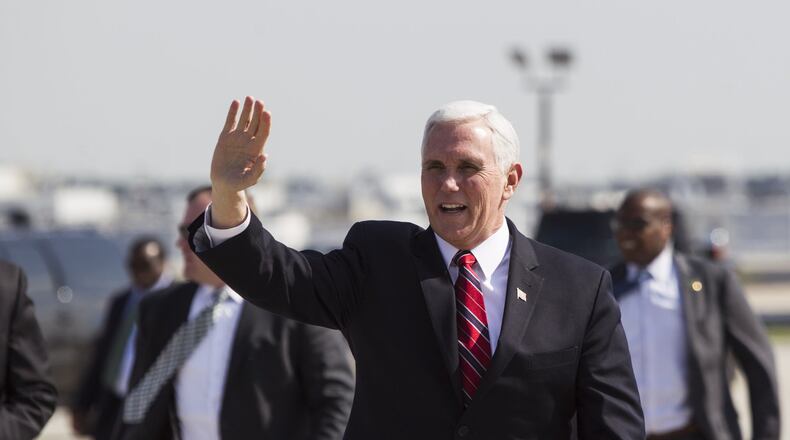Vice President Mike Pence trekked to Atlanta on Friday with a pair of missions: energizing a coalition of conservatives that powered him and President Donald Trump to office and raising loads of cash for the financially stretched Georgia GOP.
He tried to do both by turning to the $1.5 trillion package of federal tax cuts that Republicans adopted last year without a single Democratic vote, making clear that his party will increasingly rely on the initiative ahead of a tumultuous midterm vote.
“Georgia’s economy is booming as never before,” Pence told a crowd of hundreds gathered at the Loews Atlanta Hotel. “Growth is back. Confidence is back. In a word, America is back with President Donald Trump in the White House.”
It’s an early effort to rebut a wave of Democrats, including an unprecedented number of women, trying to channel outrage against Trump into electoral victory and chip into the GOP’s control of state politics. They are focusing on top-ticket races and down-ballot contests against incumbents who have rarely — if ever — faced a credible challenger.
The races will put the traditional Republican coalition in Georgia to the test. The GOP ascended to power in the early 2000s by building an alliance of rural voters who were long loyal Democrats and more moderate suburbanites who valued the party’s fiscal policies.
But Trump’s rise in 2016 strained that alliance. Although the president carried the state by 5 points, he sputtered in the suburbs, where the traditional GOP strongholds of Cobb and Gwinnett counties flipped to the Democratic column for the first time since Jimmy Carter was in the White House.
Conservatives hope to prove the Trump-Pence ticket has staying power and that the president’s brand won’t hurt down-ticket candidates in November when he’s not on the ballot.
“Based on the turnout and the response for this event, I think that the momentum and the excitement is still very much there,” U.S. Rep. Karen Handel, who with Trump’s help last year won the nation’s most expensive U.S. House race in history, said as she motioned to the hundreds of supporters who packed the Midtown hotel ballroom.
She then pointed to Trump’s role in a Pennsylvania election this month, where Democrat Conor Lamb narrowly edged Republican Rick Saccone in a district the president easily carried in 2016.
“I can tell you that the president coming to Pittsburgh, contrary to what some have reported, I believe got Saccone as close as he got,” she said. “And without the president he might not have been as close.”
Democrats have tried to funnel frustration with the tax plan to energize voters. They call it a corporate giveaway that leaves middle-class voters in the lurch. And they say Lamb’s opposition to the plan proved the tax cuts aren’t as meaningful as Republicans avow.
“Despite the talking points delivered by Pence today in Atlanta, the Trump-GOP tax bill is clearly a bad deal for Georgians and they’ll make their voices heard when they head to the polls this year,” said Francisco Pelayo of the Democratic National Committee.
‘Starting to make a difference’
What’s clear is that Georgia Republicans running for state and federal office will put the tax cuts at the center of their election platforms.
In Congress, GOP incumbents highlight the recent lower unemployment numbers and some encouraging metrics, and they tout the one-time bonuses that some Georgia corporate giants doled out to employees as proof the tax plan is working.
And U.S. House Speaker Paul Ryan spoke to cheering employees at Home Depot's headquarters earlier this month to tout the benefits of a plan he said improved "the worst tax code in the industrialized world." Pence, in his Friday speech, called it a sign the "country is coming back."
State officeholders have seized on legislation recently signed by Gov. Nathan Deal that cut taxes on Georgians by an estimated $330 million over five years. That income tax cut wiped out a potential windfall for states that the federal law created by eliminating some deductions.
Even as Republican candidates for governor rally behind the tax cut, Democrats are split over how to handle it.
Former state Rep. Stacey Evans supports the cuts and touted the benefits of “tax relief” if done responsibly. She said she would push to cut wasteful spending in Georgia’s $26 billion budget to fund an expansion of the state’s Medicaid program, a long-held Democratic goal.
Her rival, former House Minority Leader Stacey Abrams, said she would reverse the tax cuts and funnel the extra money to boost the Medicaid program, which Deal and other Republicans have said is too costly in the long run.
In a recent interview with the Peachpod podcast, she compared the economic impact of boosting the Medicaid program to Georgia's hunt for Amazon's second headquarters and the 50,000 high-paying jobs it promises.
"Our willingness to invest in one and not invest in the other shows a wrongheaded approach to what we should be doing in the state," she said in the interview. "My intention is to make certain that we're investing and lifting up all Georgians, and not simply focusing on our favorite ideas."
After his speech, Pence headed to a Georgia GOP fundraiser to raise cash for a party trying to dig out of a debt totaling more than $600,000, largely from legal bills linked to a recently settled racial discrimination lawsuit. Before the vice president left, he told a cheering crowd to stay engaged in politics.
“That’s just what we call a good start. These tax cuts are just starting to make a difference,” he said. “It’s not just about lower taxes. It’s also about bigger paychecks that come for businesses investing in American jobs.”
Never miss a minute of what's happening in Georgia Politics. Subscribe to PoliticallyGeorgia.com.
About the Author
Keep Reading
The Latest
Featured




